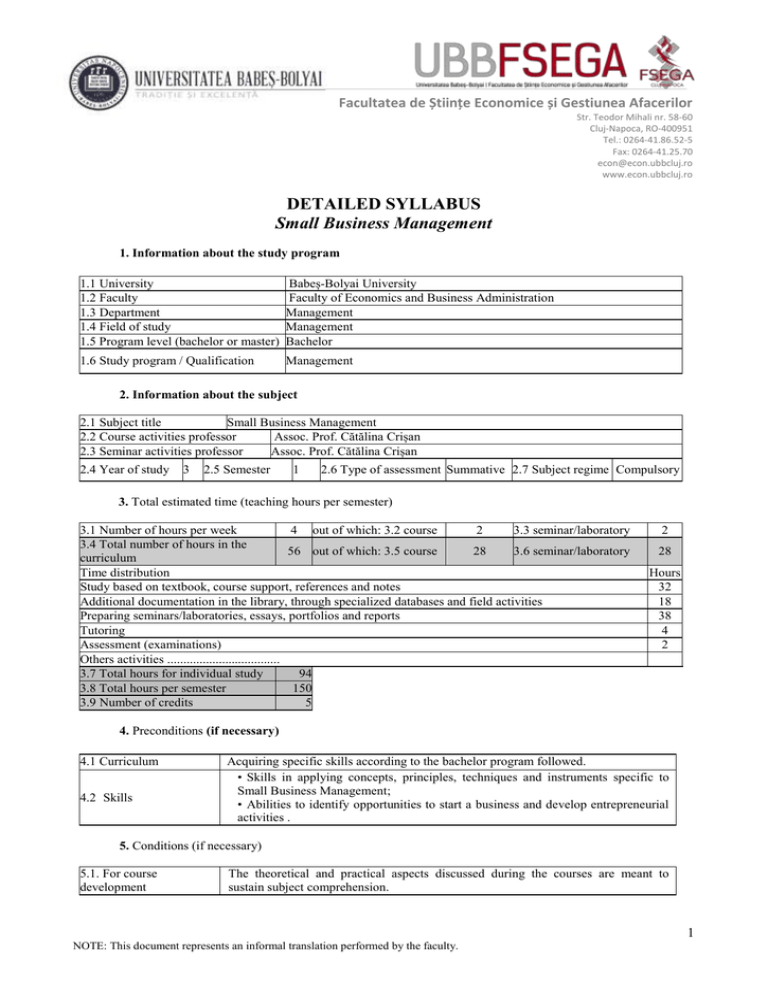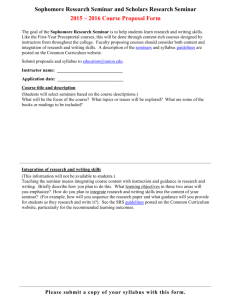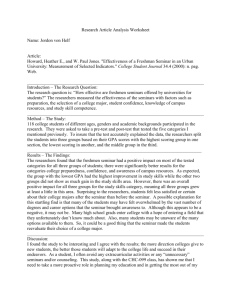
Facultatea de Științe Economice și Gestiunea Afacerilor
Str. Teodor Mihali nr. 58-60
Cluj-Napoca, RO-400951
Tel.: 0264-41.86.52-5
Fax: 0264-41.25.70
econ@econ.ubbcluj.ro
www.econ.ubbcluj.ro
DETAILED SYLLABUS
Small Business Management
1. Information about the study program
1.1 University
1.2 Faculty
1.3 Department
1.4 Field of study
1.5 Program level (bachelor or master)
Babeș-Bolyai University
Faculty of Economics and Business Administration
Management
Management
Bachelor
1.6 Study program / Qualification
Management
2. Information about the subject
2.1 Subject title
Small Business Management
2.2 Course activities professor
Assoc. Prof. Cătălina Crișan
2.3 Seminar activities professor
Assoc. Prof. Cătălina Crișan
2.4 Year of study
3
2.5 Semester
1
2.6 Type of assessment Summative 2.7 Subject regime Compulsory
3. Total estimated time (teaching hours per semester)
3.1 Number of hours per week
4 out of which: 3.2 course
2
3.3 seminar/laboratory
3.4 Total number of hours in the
56 out of which: 3.5 course
28
3.6 seminar/laboratory
curriculum
Time distribution
Study based on textbook, course support, references and notes
Additional documentation in the library, through specialized databases and field activities
Preparing seminars/laboratories, essays, portfolios and reports
Tutoring
Assessment (examinations)
Others activities ...................................
3.7 Total hours for individual study
94
3.8 Total hours per semester
150
3.9 Number of credits
5
2
28
Hours
32
18
38
4
2
4. Preconditions (if necessary)
4.1 Curriculum
4.2 Skills
Acquiring specific skills according to the bachelor program followed.
• Skills in applying concepts, principles, techniques and instruments specific to
Small Business Management;
• Abilities to identify opportunities to start a business and develop entrepreneurial
activities .
5. Conditions (if necessary)
5.1. For course
development
The theoretical and practical aspects discussed during the courses are meant to
sustain subject comprehension.
1
NOTE: This document represents an informal translation performed by the faculty.
5.2. For seminar /
laboratory development
According to the discipline curriculum the seminars will be interactive. Also,
discussions and presentations will take place base on case studies and exercises that
are meant to sustain subject’s applicability.
6. Acquired specific competences
Professional
competences
Transversal
competences
Students will have the possibility to use Small Business Management concepts, methods,
instruments that applied properly lead to successful business. Also they will have the opportunity
to learn how develop a small business and to ensure its organic groth.
• Demonstrate concern for the improvement of professional business results by taking part in a
multidisciplinary team ;
• Undertake involvement in research, such as documenting, developing of literature
syntheses, scientific papers and articles;
• Participate in projects with scientific character and demonstrate the ability to identify training
opportunities for the future.
7. Subject objectives (arising from the acquired specific competences)
7.1 Subject’s
general objective
Ability to initiate and carry out activities meant to develop a small business by gathering and
using the required resources.
7.2 Specific
objectives
Understanding the complexity of activities like finding the proper location for a new
business, to create a proper marketing campaign and a strong team due to limited resources,
etc.
Develops proper skills to enable the student to identify the cause of problems and provide
appropriate solutions to specific issues.
8. Contents
8.1 Course
The foundations of Entrepreneurship
Ways for starting a business
Inside the entrepreneurial mind: from ideas to reality
Strategic Management process in SME
Choosing the right location and layout
E-Commerce and the Entrepreneur
Entrepreneurial Marketing
Global Aspects of Entrepreneurship
Building a New Team Venture and Planning for the new generation
Social Entrepreneurship
Teaching methods
Interactive Course
Interactive Course
Interactive Course
Interactive Course
Interactive Course
Interactive Course
Interactive Course
Interactive Course
Interactive Course
Interactive Course
Observations
2 lectures
2 lectures
1lecture
1 lecture
1 lecture
2 lectures
1 lecture
1 lecture
1 lectures
2 lecture
2
NOTE: This document represents an informal translation performed by the faculty.
References:
1. Barringer, B., Ireland, D., 2010, Entrepreneurship. Successfully launching new ventures, Third edition,
Pearson/Prentice Hall, New Jersey.
2. Crișan Cătălina-Silvia, 2012, Antreprenoriatul social ai Responsabilitatea sociala corporatista,
RISOPRINT , CLUJ-NAPOCA, 2012, P. 223
3. Borza Anca, Crișan Cătălina-Silvia, Bordean Ovidiu-Niculae, Mureșan Anamaria, 2009,
Antreprenoriat. Managementul firmelor mici si mijlocii. Concepte si studii de caz, RISOPRINT ,
CLUJ-NAPOCA, , P. 329
4. Morse, E., Mitchell, R., 2006, Cases in entrepreneurship. The venture creation process, Sage
Publications, USA.
5. Scarborough, N, 2011, Essentials of entrepreneurship and small business management, Sixth edition,
Pearson-Prentice Hall, New Jersey.
6. Scarborough N., Wilson D., Zimmerer, T., 2009, Effective Small Business Management, Ninth edition,
Prentice Hall, New Jersey.
7. Stokes D., Wilson N., 2006, Small Business Management and Entrepreneurship, C&C Offset Printing
Co, LTD, China, BCU.
8. Zimmerer, T., Scarborough, N., Wilson, D., 2008, Essentials of entrepreneurship and small business
management, Fifth edition, Pearson-Prentice Hall, New Jersey.
8.2 Seminar/laboratory
Teaching methods
Kalistra’s fine chocolate
Interactive seminar
Trough sale
Interactive seminar
Mixing business and friendship
Interactive seminar
Successories
Interactive seminar
A franchisor’s dilemma
Interactive seminar
Catfish Creek Canoe Company
Interactive seminar
LapSap
Interactive seminar
Peter Pap Oriental Rugs
Interactive seminar
Medina Bakery
Interactive seminar
Brenda Galilee Rhodes, SugarBeets Productions
Interactive seminar
Cafe Direct
Interactive seminar
Project presentation
Interactive seminar
Drawing final conclusions and providing the seminar scores
Interactive seminar
References:
1. Borza A., Mitra, C., Bordean, O., Supuran, R., Mureşan, A., (2009), Antreprenoriat.
Managementul firmelor mici şi mijlocii. Concepte şi studii de caz, Ed. Risoprint, Cluj-Napoca.
2. Timothy S Hatten (2009), Small Business Management, Entrepreneurship and Beyond, USA
3. Morse, E., Mitchell, R., 2006, Cases in entrepreneurship. The venture creation process, Sage
Publications, USA.
4. Scarborough N., Wilson D., Zimmerer, T., 2009, Effective Small Business Management, Ninth
edition, Prentice Hall, New Jersey.
5. Mellahi, K., 2010, Global strategic management, Oxford University Press, UK.
Observations
1 seminars
1 seminars
1 seminars
1 seminars
1 seminars
1 seminars
1 seminars
1 seminars
1 seminars
1 seminars
1 seminars
2 seminars
1 seminars
9. Corroboration / validation of the subject’s content in relation to the expectations coming from
representatives of the epistemic community, of the professional associations and of the representative
employers in the program’s field.
The discipline “ Small Business Management” is included in the accreditation given by the Association of
Chartered Certified Accountants (ACCA);
This discipline will actively contribute by strengthening the students' practical skills of Small Business
Management, because during the courses will be invited successful managers and entrepreneurs who will share
their success by providing useful examples and situations faced by them during their career.
10. Assessment (examination)
3
NOTE: This document represents an informal translation performed by the faculty.
Type of activity
10.1 Assessment criteria
10.2 Assessment methods
10.4 Course
The final exam will consist of
The ability to actively participate to the
several types of questions that will
discussions during the course.
Ability to adequate use of concepts, methods address specific issues from the
Strategic Management course. In
and procedures learned.
order to pass the exam the student
Active participation during the group
has to obtain at least 5 (five).
discussions based on theoretical and
practical aspects studied, and to provide
pertinent arguments.
Develop pros and cons arguments for
distinctive situations.
10.5
Ability to use correctly the concepts learned
Seminar/laboratory at the course/seminars and using them to
The seminar points consist of
solve the case studies requirements.
Ability to take decisions based on the attendance at seminar 5%, student
analysis of a given situation using the implication during seminar 20%
methods, models and strategies learned at and seminar project 25%
the course and seminars;
Assessment of own or other peoples
arguments/contributions;
10.3 Weight in
the final grade
50%
50%
10.6 Minimum performance standard
• It is necessary to obtain a minimum grade of 5 (five) in order to pass this subject;
• The grades being granted are between 1 (one) and 10 (ten);
• Students must approach each element (question, problem) within the exam sheet;
• The exam is written and takes approximately 120 minutes;
Date of filling
10.01.2015
Signature of the course professor
Assoc. Prof. Cătălina Silvia Crișan
Date of approval by the department
19.02.2015
Signature of the seminar professor
Assoc. Prof. Cătălina Silvia Crișan
Head of department’s signature
Prof. Răzvan Nistor
4
NOTE: This document represents an informal translation performed by the faculty.







